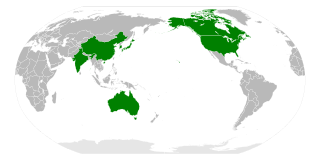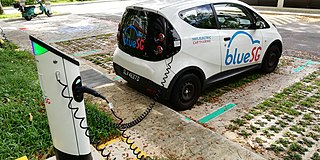
The Kyoto Protocol was an international treaty which extended the 1992 United Nations Framework Convention on Climate Change (UNFCCC) that commits state parties to reduce greenhouse gas emissions, based on the scientific consensus that (part one) global warming is occurring and (part two) that human-made CO2 emissions are driving it. The Kyoto Protocol was adopted in Kyoto, Japan, on 11 December 1997 and entered into force on 16 February 2005. There were 192 parties (Canada withdrew from the protocol, effective December 2012) to the Protocol in 2020.
The United Nations Framework Convention on Climate Change (UNFCCC) established an international environmental treaty to combat "dangerous human interference with the climate system", in part by stabilizing greenhouse gas concentrations in the atmosphere. It was signed by 154 states at the United Nations Conference on Environment and Development (UNCED), informally known as the Earth Summit, held in Rio de Janeiro from 3 to 14 June 1992. It established a Secretariat headquartered in Bonn and entered into force on 21 March 1994. The treaty called for ongoing scientific research and regular meetings, negotiations, and future policy agreements designed to allow ecosystems to adapt naturally to climate change, to ensure that food production is not threatened and to enable economic development to proceed in a sustainable manner.

The Climate Group is a non-profit organisation that works with businesses and government leaders around the world to address climate change. This group has programmes focusing on renewable energy and reducing greenhouse gas emissions. Launched in 2004, the organisation operates globally with offices in the UK (headquarters), the United States and India.

The Asia-Pacific Partnership on Clean Development and Climate, also known as APP, was an international, voluntary, public-private partnership among Australia, Canada, India, Japan, the People's Republic of China, South Korea, and the United States announced July 28, 2005 at an Association of South East Asian Nations (ASEAN) Regional Forum meeting and launched on January 12, 2006 at the Partnership's inaugural Ministerial meeting in Sydney. As of 5 April 2011, the Partnership formally concluded although a number of individual projects continue. The conclusion of the APP and cancellation of many of its projects attracted almost no media comment.

Clean technology, in short cleantech, is any process, product, or service that reduces negative environmental impacts through significant energy efficiency improvements, the sustainable use of resources, or environmental protection activities. Clean technology includes a broad range of technology related to recycling, renewable energy, information technology, green transportation, electric motors, green chemistry, lighting, grey water, and more. Environmental finance is a method by which new clean technology projects can obtain financing through the generation of carbon credits. A project that is developed with concern for climate change mitigation is also known as a carbon project.
Post-Kyoto negotiations refers to high level talks attempting to address global warming by limiting greenhouse gas emissions. Generally part of the United Nations Framework Convention on Climate Change (UNFCCC), these talks concern the period after the first "commitment period" of the Kyoto Protocol, which expired at the end of 2012. Negotiations have been mandated by the adoption of the Bali Road Map and Decision 1/CP.13.
After the 2007 United Nations Climate Change Conference held on the island of Bali in Indonesia in December 2007, the participating nations adopted the Bali Road Map as a two-year process working towards finalizing a binding agreement at the 2009 United Nations Climate Change Conference in Copenhagen, Denmark. The conference encompassed meetings of several bodies, including the 13th session of the Conference of the Parties to the United Nations Framework Convention on Climate Change and the third session of the Conference of the Parties serving as the meeting of the Parties to the Kyoto Protocol.

The 2009 United Nations Climate Change Conference, commonly known as the Copenhagen Summit, was held at the Bella Center in Copenhagen, Denmark, between 7 and 18 December. The conference included the 15th session of the Conference of the Parties to the United Nations Framework Convention on Climate Change (UNFCCC) and the 5th session of the Conference of the Parties serving as the meeting of the Parties to the Kyoto Protocol. According to the Bali Road Map, a framework for climate change mitigation beyond 2012 was to be agreed there.
The Copenhagen Climate Council is a global collaboration between international business and science founded by Erik Rasmussen founder of the leading independent think tank in Scandinavia, Monday Morning, based in Copenhagen. The councilors of the Copenhagen Climate Council have come together to create global awareness of the importance of the UN Climate Summit (COP15) in Copenhagen, December 2009, and to ensure technical and public support and assistance to global decision makers when agreeing on a new climate treaty to replace the Kyoto Protocol from 1997.
The White House Office of Energy and Climate Change Policy was a new government entity in the United States created in 2008 by President Barack Obama by Executive Order that existed for a little over two years when it was combined with another presidential office in April 2011. The office was created in order to coordinate administration policy on energy and global warming.
The Global Climate Network (GCN) is an alliance of influential think tanks and research institutes in different countries that collaborate on research into climate change policy and whose stated aim is to help address the political blockages to ambitious action to tackle global warming.

The climate change policy of the United States has major impacts on global climate change and on global climate change mitigation. This is because the United States is the second largest emitter of greenhouse gasses in the world after China, and is among the countries with the highest greenhouse gas emissions per person in the world. In total the United States has emitted over 400 billion metric tons of greenhouse gasses, more than any country in the world.
The Copenhagen Accord is a document which delegates at the 15th session of the Conference of Parties to the United Nations Framework Convention on Climate Change agreed to "take note of" at the final plenary on 18 December 2009.
The Center for Clean Air Policy (CCAP) is an independent, nonprofit think tank that was founded in 1985 in the United States. CCAP works on climate and air quality policy issues at the local, national and international levels. Headquartered in Washington, D.C., CCAP helps policy-makers around the world to develop, promote and implement market-based approaches to address climate, air quality and energy problems while trying to balance both environmental and economic interests.
Nationally Appropriate Mitigation Action (NAMA) refers to a set of policies and actions that countries undertake as part of a commitment to reduce greenhouse gas emissions. The term recognizes that different countries may take different nationally appropriate action on the basis of equity and in accordance with common but differentiated responsibilities and respective capabilities. It also emphasizes financial assistance from developed countries to developing countries to reduce emissions.

The International Day of Forests was established on the 21st day of March, by resolution of the United Nations General Assembly on November 28, 2013. Each year, various events celebrate and raise awareness of the importance of all types of forests, and trees outside forests, for the benefit of current and future generations. Countries are encouraged to undertake efforts to organize local, national, and international activities involving forests and trees, such as tree planting campaigns, on International Day of Forests. The Secretariat of the United Nations Forum on Forests, in collaboration with the Food and Agriculture Organization, facilitates the implementation of such events in collaboration with governments, the Collaborative Partnership on Forests, and international, regional and subregional organizations. International Day of Forests was observed for the first time on March 21, 2013.

The United Nations Climate Change Conference, COP19 or CMP9 was held in Warsaw, Poland from 11 to 23 November 2013. This is the 19th yearly session of the Conference of the Parties to the 1992 United Nations Framework Convention on Climate Change (UNFCCC) and the 9th session of the Meeting of the Parties to the 1997 Kyoto Protocol. The conference delegates continue the negotiations towards a global climate agreement. UNFCCC's Executive Secretary Christiana Figueres and Poland's Minister of the Environment Marcin Korolec led the negotiations.

The United Nations Climate Change Conferences are yearly conferences held in the framework of the United Nations Framework Convention on Climate Change (UNFCCC). They serve as the formal meeting of the UNFCCC parties to assess progress in dealing with climate change, and beginning in the mid-1990s, to negotiate the Kyoto Protocol to establish legally binding obligations for developed countries to reduce their greenhouse gas emissions. Starting in 2005 the conferences have also served as the "Conference of the Parties Serving as the Meeting of Parties to the Kyoto Protocol" (CMP); also parties to the convention that are not parties to the protocol can participate in protocol-related meetings as observers. From 2011 to 2015 the meetings were used to negotiate the Paris Agreement as part of the Durban platform, which created a general path towards climate action. Any final text of a COP must be agreed by consensus.

Protect Our Winters (POW) is a 501(c)(3) nonprofit that focuses its efforts on legislation regarding climate change. The nonprofit, created in 2007 by professional snowboarder Jeremy Jones, strives to turn outdoor enthusiasts into climate advocates. According to the group's mission statement, "Protect Our Winters leads a community of athletes, creative-pioneers and business leaders to achieve this mission." The organization's headquarters are located in Boulder, Colorado, United States.

The 2016 United Nations Climate Change Conference was an international meeting of political leaders and activists to discuss environmental issues. It was held in Marrakech, Morocco, on 7–18 November 2016. The conference incorporated the twenty-second Conference of the Parties (COP22), the twelfth meeting of the parties to the Kyoto Protocol (CMP12), and the first meeting of the parties to the Paris Agreement (CMA1). The purpose of the conference was to discuss and implement plans about combatting climate change and to "[demonstrate] to the world that the implementation of the Paris Agreement is underway". Participants work together to come up with global solutions to climate change.












